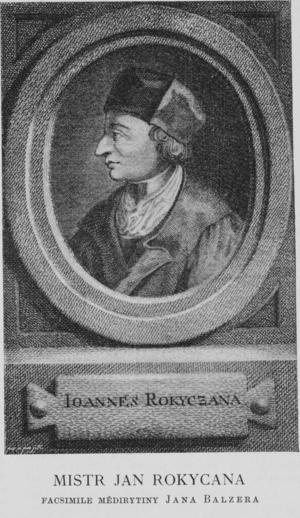Jan Rokycana facts for kids
Jan Rokycana (also known as John of Rokycany or Jan of Rokycany in English, and Jan z Rokycan in Czech) was an important Czech religious leader. He was born around 1396 in Rokycany and passed away on February 21, 1471, in Prague. Jan Rokycana was a key figure in the Hussite movement, which was a big religious change in the Kingdom of Bohemia (today's Czech Republic) called the Bohemian Reformation.
Contents
Jan Rokycana's Journey
Jan Rokycana started his life in a monastery in Rokycany when he was young. Later, he left the monastery to study in Prague. He earned his first university degree, a baccalaureate, in 1415.
Early Challenges and Leadership
Jan Rokycana joined a group that was against a leader named Jan Želivský. Because of this, he had to leave Prague for a while. He also disagreed with another group called the Taborites, especially at a place called Konopiště in 1423. Later, back in Prague, he spoke out against Jan Žižka, a famous military leader, after a battle.
In 1427, Jan Rokycana became the vicar (a church official) of Týn church. He even stood up to Sigismund Korybut, who was a powerful duke. By 1429, he became the main leader for the Hussite clergy in the Prague area. He earned his Master of Arts degree in 1430. In 1435, he became the head of Charles University, which is a very important university.
Shaping Hussite Beliefs
On October 4, 1441, Jan Rokycana called a big meeting in Kutná Hora. At this meeting, the main ideas of the Hussite faith were officially written down and became the law of the land. In 1442, he made peace with another important person, Jan Příbram. By 1444, the courts decided in his favor against the Taborites. This meant the Taborites had to follow the agreed-upon Hussite rules.
Reaching Out to Others
In 1449, Jan Rokycana started writing letters to Pope Nicholas V. He needed the Pope's help to allow new priests to be ordained (officially made priests). He even tried to visit the Pope in person but couldn't travel through Germany.
Because of this, in 1451, he began talking with leaders in Constantinople (a major city in the Byzantine Empire). He hoped the Hussite Church and the Greek Orthodox Church could work together. However, these talks ended in 1452 when Constantinople was captured by the Ottoman Turks.
Working with Kings
King Ladislaus Posthumus (who ruled from 1440 to 1457) was not sure about Jan Rokycana's plans. So, the King often avoided listening to Rokycana's sermons. In 1457, Jan Rokycana started writing to the Pope again, this time to Pope Callixtus III. But this communication stopped when King Ladislaus died.
Things got better when George of Poděbrady became king. Even though King George wanted to reduce the church's power, Jan Rokycana supported his election. Jan Rokycana fully backed King George's ideas. He even had all the church bells ring to celebrate a peace agreement. In return, King George saw Rokycana as the church's main representative. The King would attend Rokycana's church services and also services at St. Vitus Cathedral.
However, in 1461, King George wanted to become the leader of the Holy Roman Empire. This would have meant giving up some Hussite beliefs, especially the use of the chalice (cup) during communion. Because of this, Jan Rokycana began to speak against King George in his sermons.
On February 7, 1465, he took part in a discussion about the king's role. After this, the king asked the church for more cooperation. A year later, in 1466, Jan Rokycana had a stroke, which made it hard for him to speak. He was buried in Týn church.
For his official seal, Jan Rokycana used a horseshoe with a star. This was probably a way to remember his father, who was a blacksmith.
Jan Rokycana's Writings and Songs
Jan Rokycana was a very active writer and speaker. Many of his works were collected by his students.
- Postilla: This was a collection of his lectures from 1453 to 1457. It's considered a very interesting Czech postilla (a book of sermons). It didn't focus on difficult religious problems but instead talked about the everyday lives of people back then.
- Latinská postilla: Another collection of sermons, but in Latin.
- Výklad zjevení svatého Jana: This means "A Discussion of The Revelations of Saint John".
- Kázání u Kutné Hory: These were sermons he gave at Kutná Hora.
- Řeči pronesené na koncilu Basilejském: These were speeches he gave at the Council of Basel, an important church meeting.
- Synodální řeči: Speeches given at church meetings called a Synod.
- O sedmi vášních a vadách: This means "Seven Passions And Problems".
- Acta synodální: Records of the Synod meetings.
- Latinský slovník: A Latin Dictionary.
- Tractatus de eucharista: A writing about the Eucharist (Holy Communion).
- Tractatus de septem sacramentis: A writing about the seven sacraments of the church.
- Contra sex propositiones trivolas doctorum apostatarum: A writing against six simple statements by "apostate doctors" (scholars who had left the church).
Some people also believe he wrote several songs:
- Vítaj milý Jezu Kriste: "Welcome Dear Jesus Christ"
- Zdrávas dievko
- Cierkev svatá v posledních dnech velmi neznamenitá: "The Holy Church in Recent Days Very Unremarkable". For this song, he clearly wrote both the words and the music.
See also
- Hussites
- Hussite Wars
- Czech Literature
- Czech lands: 1198-1526
 | Percy Lavon Julian |
 | Katherine Johnson |
 | George Washington Carver |
 | Annie Easley |



